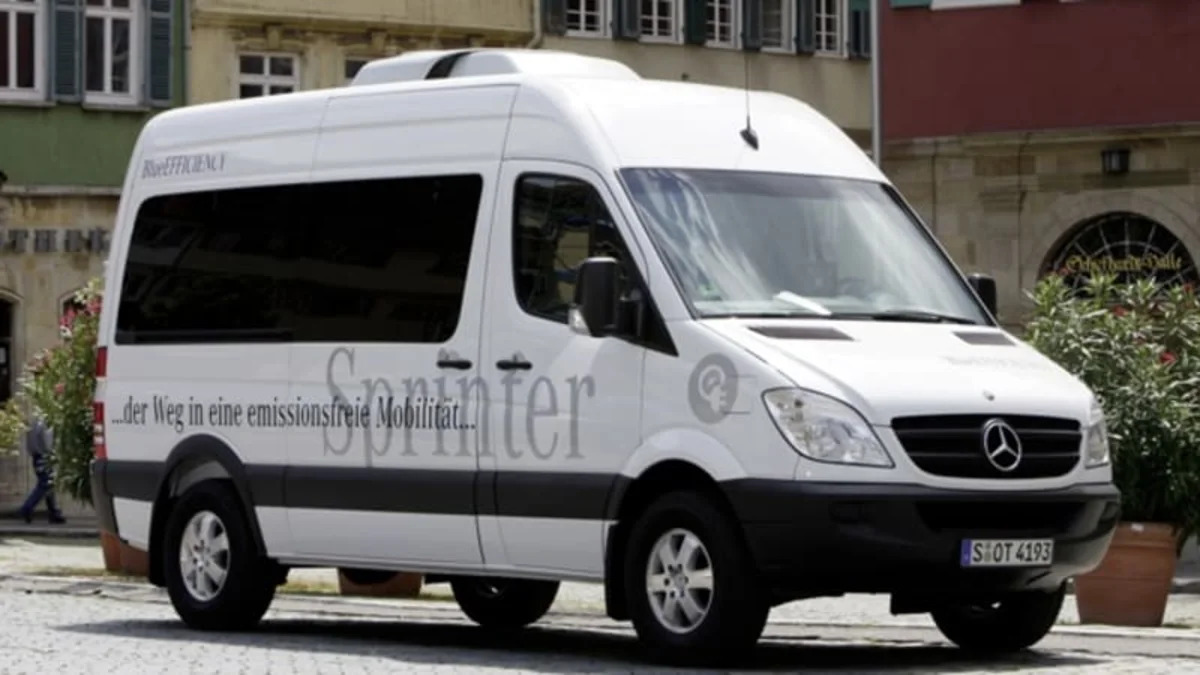
The German environment ministry has awarded Mercedes-Benz a grant of up to €9 million a field test of battery electric Sprinter vans. The money will be used to fund the research and development of the vans as well as the construction and deployment. Mercedes will produce up to 50 plug-in Sprinters that have no internal combustion powertrain at all. The vans will use lithium ion batteries and, among other things, Mercedes will be studying the performance of the batteries under varying temperature conditions.
The vans will be going into service with fleet customers starting in 2010. Vans are proving to be a particularly popular application for electric drive since absolute range is less of an issue and the frequent stops allow the vehicles to make use of regenerative braking. Mercedes hopes to move this technology to affordable commercial production in the near future.
[Source: Daimler]
PRESS RELEASE:
Federal German Ministry for the Environment, Nature Conservation and Reactor Safety (BMU) subsidises battery-electric Mercedes-Benz vans
Stuttgart/Berlin, Nov 17, 2009
*Federal German Ministry for the Environment, Nature Conservation and Reactor Safety (BMU) subsidises project with up to nine million Euro
*Support for the electrification of Mercedes-Benz vans
*Development of cutting-edge technology in German production locations
*First deliveries to selected customers already planned for 2010
Stuttgart/Berlin – Mercedes- Benz Vans is to receive a grant of up to nine million Euro from the Federal German Ministry for the Environment, Nature Conservation and Reactor Safety (BMU) for the research and development, testing and trial of electrically powered vans. The finds are being made available from the German government's Economic Support Programme 2.
A corresponding declaration of intent was signed. The grant is in support of Daimler AG's efforts to realise environmentally friendly goods transport in urban areas. Battery-powered vehicles emit no carbon dioxide or pollutants, and have significantly lower noise emissions than conventionally powered vehicles, which makes them very suitable for use in environmentally sensitive inner-city areas.
Up to 50 Mercedes-Benz vans will be produced and delivered to customers as part of this project. The drive system is configured solely for electric operation, and dispenses with a powertrain designed for internal combustion engines.
The findings from this project will be directly incorporated into the further development of these vehicles.
There is a particular focus on adaptation of the drive system, energy management and the reuse of braking energy (recuperation). Other aspects of the project also include the provision of replacement parts, charging and diagnostic systems, however. The lithium-ion battery that supplies the electro-van with its power is another major development emphasis.
Temperature is an important factor for the operating life and performance of the lithium-ion battery, for example. The aim of all the sub-projects is to extend the technologies developed to other van model series, and to achieve series production maturity within a short time.
Research and development in the German Mercedes-Benz locations mainly takes place in Stuttgart, with the aim of both safeguarding employment and developing know-how in the field of electro-mobility and its cutting-edge technology in Germany. New project management methods are also employed to achieve shorter development cycles, with the supply industry and users also included in these efforts. Daimler AG is set to become the first vehicle manufacturer to integrate the production of electric vans directly into its plants.
Daimler AG has many years of experience with battery-powered vehicles: as early as 1972 a van with an environmentally drive system of this kind was built and successfully used at the Olympic Games in Munich.
Infrastructure-related aspects will also be explored during these major trials. Mercedes-Benz Vans will already start testing the electro-van with selected customers in 2010. These target customers are primarily fleet operators and public bodies conducting transport operations in environmentally sensitive areas. The main emphasis here is on short-range operating profiles with frequent stops in inner-city areas.
The goal is to market these vehicles at an acceptable cost for all parties involved in the future.


Sign in to post
Please sign in to leave a comment.
Continue